
December 26, 2008
 CR Holiday Interview #4: Sean T. Collins On The Year In Alternative/Arts Comics
CR Holiday Interview #4: Sean T. Collins On The Year In Alternative/Arts Comics

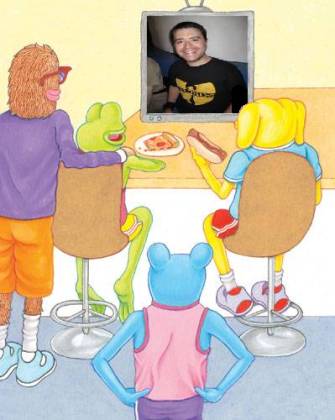
*****
I've had
Sean T. Collins penciled in for one of the 2008 critic's mini-dialogues for a long while. I ended up
drafting him into the 2007 holiday interview series when I had a cancellation, and so re-scheduled him for a repeat appearance 2009. However, when Sean mentioned he'd probably be reading fewer comics in 2009, I wanted to make sure I talked to him again sooner rather than later.
I find Collins' viewpoint valuable because of our differences. He's younger than I am, which places him on a different track in terms of what he was reading and when. He also doesn't have associations with comics stretching back into childhood, which I think gives him a view of comics much less burdened by nostalgia.
The following too-brief back and forth took place last week. I hope you'll forgive me its resemblance to a survey. I'm sure Sean and I could have gone on for 15 more questions on
Alan's War or Lynda Barry's work, two things about which we seem to strongly disagree, but for this piece it seemed appropriate to hit quickly and move on. I'm also more interested in getting Sean's view than defending my own. Hopefully, a compelling picture of 2008 can be had from the breadth and variety of comics involved in our chat. For more from Collins, you can read his reviews and link-blogging at his own site, other bits of his writing on comics in occasional appearances in places like this site and
Comic Book Resources, and you can check out some of his comics
here.
*****
TOM SPURGEON: Sean, this year you reviewed three comics a week on your site, in addition to some of the other comics writing work that you do. How does processing that many comics in that relentless fashion change the way you read them? Are you more observant, more attuned to certain aspects in the art form? Is there any danger that you won't stay sharp and might become too absorbed into comics approaches to make clear distinctions?
SEAN T. COLLINS: Before I answer that, I want to paraphrase
Aragorn: When it comes to relentless reviewing, Tom, you bow to no one.
SPURGEON: Well, I had to look it up, but le hannon. What about it, though? Do you read differently now?
COLLINS: I've never really thought about my thrice-weekly reviewing in terms of how it changes how I read the comics, just how I write about them. I definitely feel like writing this many reviews has made me a better critic, better at expressing my thoughts about comics -- better at cross-referencing them too, I think, so that what I'm seeing and thinking and learning in one comic proves useful when dealing with another.
I think you might be on to something by suggesting I might be more observant. The thing about doing these reviews the way I did them is that I don't really have time to kick back and read a chapter of a comic here and there over the span of a couple weeks, then sort of mush it around in my brain for a while afterwards. Though backlogging reviews did give me a little more leeway now and then, for the most part it was read it, review it, post it. From the springtime onward, in fact, most of the reviews were written on the Long Island Rail Road the day I finished that particular book. So I was really forcing myself to intensely engage with the book as I read it -- not necessarily with the goal of doing anything differently as a reader or a thinker, but with an eye towards the eventual review -- and making sure to collect my thoughts and keep them as focused as possible.
That immediacy could be a curse as well as a blessing, I suppose. Now, my whole life as a writer I've been a first-draft guy. My attitude is that if I didn't want to write exactly what I just wrote, I wouldn't have written it in the first place. But there are first-and-only drafts that you thoughtfully commit to TextEdit after mulling them over for a while, and there are first-and-only drafts that you pound out between the Jamaica and Bethpage stops on the Ronkonkoma line. Every once in a while I'll realize I left out something I really wanted to say, or could have said something better if I'd just taken a little more time to get it right. But that kind of thing is small potatoes; the biggest structural pitfall is that my initial take on comics tends to be more positive than what I might think a couple weeks down the line, so there might be a slight bias toward giving stuff a good review that could be mitigated if I were looking at things with more temporal distance and was able to judge whether or not it stuck with me.
SPURGEON: I wanted to speak to some general issues first. We both wrote critically of two essays by the writer Steven Grant where he spoke to his futility in placing more than two reprints on a Best-Of list. I don't necessarily want you to re-argue your rejection of his essay, but what do you think leads people to make such severe statements about the state of the art form?
COLLINS: Well, I chalked it up then to either not reading enough comics or simple bad taste, which I could more charitably refer to as a difference of opinion about the quality of the books that came out this year. Beyond that? I think comics punditry has a weakness for bomb-throwing, which has almost always been terrible for the credibility and quality of comics punditry. But it works! I mean, a lot of people paid attention to that column. So people are going to keep saying Hip Hop Is Dead. As for me, I'm perfectly happy to reiterate that saying there were only two best-of-worthy comics to come out this year is an unsupportable position based on what I'm seeing when I look at my bookshelf. Also, defending that position by saying 2008 wasn't as good as some other years -- agreed -- isn't any kind of defense at all.
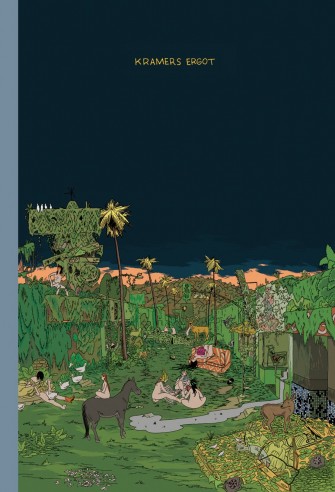 SPURGEON: Similarly, I think we both objected to some of the more severe criticism of the $125 price tag on
SPURGEON: Similarly, I think we both objected to some of the more severe criticism of the $125 price tag on Kramers Ergot
Vol. 7. Do you have any sympathy at all for the opposite side of that argument? I couldn't quite ever tell what they were getting at; since it was a view shared by several people, what do you think is a source of strength in their criticism?
COLLINS: I think there were a bunch of different factors at play here. Resenting the idea of a luxury comic book. Not being able to afford it. Not liking alt-comix people like
Chris Ware and
Dan Clowes. Not liking post-
Fort Thunder art comics. Simple ignorance as to the parameters of the project or the logistics of publishing. Good old-fashioned comics-fan reverse snobbery. Internet trollishness. A belief that the goal of all comics should be outreach to non-comics readers. Just not being much interested in this particular collection. Defining one's choices as a consumer of art in terms of good and evil. Combinations of some or all of those. I don't have much sympathy for any of them, no, at least not in terms of building them into that weird crusade against the book that developed. If you don't like it or can't afford it, don't buy it! I have no idea how that argument built up the strength it did in the face of what seems to me like basic common sense.
That said, once upon a time I complained upon
Bjork's post-
Matthew Barney deluge of expensive box sets and dozens of live albums and so on as a release pattern targeted to rich art gallery owners, and friends of mine had to say the exact same thing to me -- if you don't like it or can't afford it, don't buy it! It's not like Bjork won't still make plain-old albums you can buy at the regular price. So I guess we can all get in that mindset from time to time.
SPURGEON: What do you think of the criticism that popped up in Grant's pair of essays and I believe has been more strongly presented by I think Eddie Campbell that the New York publishing world isn't necessarily a friend to literary comics and that its influence could yield a pernicious outcome? Do you notice a difference in quality or approach in comics that are coming from the big publishing houses? Are you fearful that book publishers may end up with an inordinate amount of influence on future comics of this type?
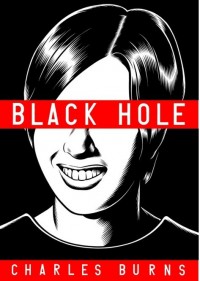 COLLINS:
COLLINS: The New York publishing world isn't a monolith, so first of all it depends on which New York publishing house you're talking about. In 2005,
Pantheon published
Black Hole,
Epileptic and
Ice Haven. The only pernicious outcome a publishing program like that could have is crushing my soul with its awesomeness. Obviously they can't all be winners. I suppose I've seen some books that privilege slick art over story or hot-button story over art. I'd guess that if things keep up you'll see a lot more memoirs; that's certainly the case with prose, and memoir comics are an easy sell in that regard and a likely default mode for these publishers. For now, I've gotten a few review copies from big publishers where I thought that the work just didn't merit this kind of platform, but that has as much to do with the comic-fan sense that the book publishers somehow confer legitimacy in a way that
Fantagraphics or
Drawn & Quarterly or
Top Shelf doesn't, which is probably my fault and not anyone else's. Inferior work is inferior work no matter who puts it out. Meanwhile, I personally find
First Second a totally baffling line, but not in any sort of pernicious way -- it's just that usually with one exception per release cycle, my tastes don't dovetail with theirs. I really do like the format they use, though.
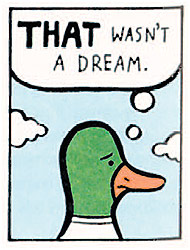
There's always a risk that when "major labels" get involved and start throwing money at artists without a whole lot under their belt, they can shape or stunt their growth in unproductive ways. I would have preferred
David Heatley finish
Overpeck than do "Race History" with his book advance, you know? But again, the vagaries and vicissitudes of publishing can steer people in funky directions no matter who's publishing them. And as I sorta alluded to just now, that's true in any medium. Sticking
MGMT on a major and on the cover of
Spin when they have a grand total of one album with one good song on it to their name is probably a pretty bad thing for MGMT in the long run.
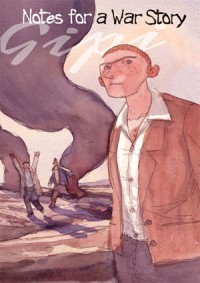
Maybe you can already gather this, but I don't see this as a huge structural problem facing comics right now. "Please, whatever you do, New York publishers, don't pay living wages to aspiring makers of literary comics!" If only we always had such problems! If good comics can somehow survive nearly 70 years of the North American industry's domination by one genre of comic book, they can survive having to put up with
American Widow in exchange for
Notes for a War Story. Economically, it's not as though the book publishers are making such a huge investment in comics that if they pull back the whole thing will collapse. Artistically, as for the notion that literary comics are now more proscribed than they were before these companies got involved, when I look around
MoCCA or
SPX or the alt-comix area of
San Diego everything is still as vibrant and wild and wide-ranging, perhaps even more than it used to be. The existence of
PictureBox alone is a rejoinder to the notion that Random House is somehow crushing the life out of alternative comics.
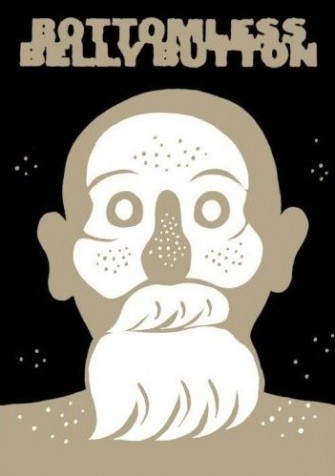 SPURGEON: I'd like you to discuss some of the more prominent books of the year, briefly, what your general take on them might be. First up:
SPURGEON: I'd like you to discuss some of the more prominent books of the year, briefly, what your general take on them might be. First up: Bottomless Belly-Button
.
COLLINS: This seemed like a really good year for
Dash Shaw to me. Prior to
BBB I'd only ever read his earliest stuff, like
Love Eats Brains and
Goddess Head -- this is leaps and bounds ahead of that, in the space of a few short years. It's much more focused, restrained, adult. The familiar canvas of the literary-novel-style family in entropy provides a solid base upon which he can play with form and symbolism all he wants without it seeming sloppy, or just like a purge of ideas. It's very sophisticated, as are the science fiction things he's done for
MOME. I deal with webcomics the way substitute teachers deal with VCRs so I haven't read
Body World yet, but I've only heard good things. So like I said, a good year, and who knows where he's headed from here? It's exciting. I should add that
Bottomless Belly Button is a crazy ambitious book, too. Don't take Fantagraphics publishing a doorstop-sized original graphic novel by a largely unproven talent for granted. I've compared it to
Blankets, but Shaw didn't have a
Goodbye, Chunky Rice under his belt beforehand.
I feel like I need to read this book again to find out how much it ultimately means to me. Based on my initial read,
I liked it.
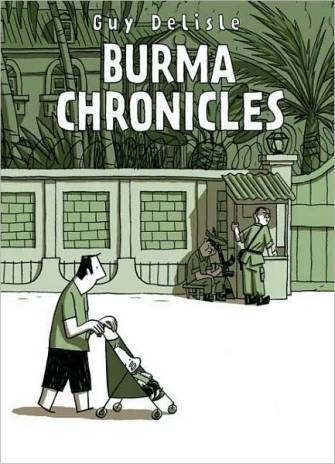 SPURGEON:
SPURGEON: Burma Chronicles
?
COLLINS: [Guy] Delisle's totalitarian travelogues are right in my wheelhouse, and this is
no exception, though I thought it got off to a shaky start with all that cutesy baby business.
SPURGEON:: Why wasn't that working for you?
COLLINS: I've seen a lot of "cool dad with a baby" comics already, you know? I'm not so interested in funny baby comics, at least not as much as I'm interested in comics about what life is like under a dictatorial regime. And whereas the animation material in
Pyongyang and Shenzhen spoke to the peculiarities of the industry in North Korea and China, the baby material in
Burma Chronicles could have just as easily taken place in Montreal.
SPURGEON: What It Is
?
COLLINS: I have eclectic taste in comics and I read a lot of them, but to prevent myself from going crazy I do have one cut-off I can comfortably apply: I won't force myself to read a book whose art I find unappealing on a surface, cursory flip-through level. That would be the case here. This looks like scrapbooking to me or something, like an arts and crafts project. I have no "in" to it. I'm not crazy about Barry's cartooning either -- her characters look annoying -- so it's not like I have a lot of incentive to dig in to the collage work.
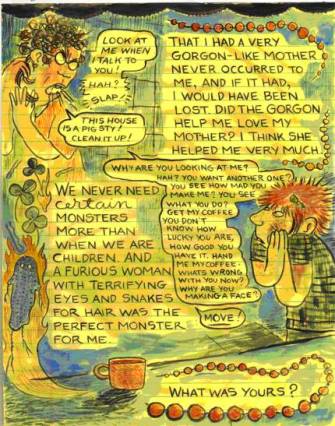 SPURGEON: Can you clarify? Because I find her work attractive, her characters mostly endearing rather than annoying and it never occurred to me not to scan as comics this latest artistic direction. Is there someone who you feel makes better art and creates less-annoying characters that works in her same general style so that we could draw a sharper distinction, maybe?
SPURGEON: Can you clarify? Because I find her work attractive, her characters mostly endearing rather than annoying and it never occurred to me not to scan as comics this latest artistic direction. Is there someone who you feel makes better art and creates less-annoying characters that works in her same general style so that we could draw a sharper distinction, maybe?
COLLINS: It's not that I'm not scanning it as comics -- I just don't like the look of this comic. It looks like a comic made from a gingerbread house or something. Wait, no, that's probably not a good way to describe it, because a comic made from a gingerbread house would be
awesome. I guess I think it's busy and cutesy and... kitschy's not the right word... I don't know. Her particular application of collage does nothing for me. That's what I meant by saying I don't have an in -- not that it's not comics, but that nothing about the aesthetic appeals to me at all. To be fair, I think I'm pretty particular about collage and what works for me and doesn't with that technique. I don't get a lot out of
Souther Salazar, either, for example.
As for her characters, I'm not saying they're annoying, I'm saying they
look annoying. Actually what I'm saying is that I'm annoyed by their design. I don't like their macaroni-shaped arms or their sorta curved-triangle bodies. This is weird, and I'm sort of stunned that I have this specific an opinion on something like this, but as I think about this it becomes apparent to me that I don't like shapes that involved gently curved lines meeting at a point. You know Marlys's glasses? The whole comic looks like that to me and I don't like that.
What can I say? Certain artists I just can't get into because of basic character design.
Pete Bagge's characters look like boogers with limbs to me. I can't get past it.
SPURGEON: "Chechen War, Chechen Women"?
COLLINS: I think I'd prefer you to have asked about
I Live Here, which
I thought was a real achievement and included notable work from a lot of people, including this from Sacco. But this was very, very intense material, even just visually -- I think it's his most "high-volume" work, just in times of how the characters are drawn and placed in the frame. It's like El Greco or something.
I've gone back and forth regarding Sacco's approach to reporting, how he tends to offer only one side of the story, usually the side with the higher casualty rate. My conclusion at the moment is that suffering is suffering, and it should be exposed regardless of context. We're all capable of looking these things up online now, we can provide whatever context we feel we need to provide; the point is this person, at this moment, is suffering because of things other people chose to do at other moments. Such stories deserve an airing.
SPURGEON: You can talk about I Live Here
if you want. What other work do you feel strongly about from that book?
COLLINS: I'm sure this will come as a huge surprise to you, Tom, but I was pretty floored by
Phoebe Gloeckner's work there. I know I've got a Friends Of Old Phoebe membership card in my wallet and everything, but this shift to digital manipulation and dioramas and dolls -- it seems like a perfectly logical visual extension of her themes regarding childhood and abuse, but it's also really radical, and it's shocking to see it work so well.
Overall I think the book was really successful in terms of coming up with novel ways to juxtapose words and images. Mia Kirshner's collaboration with sign maker Edward Kasinje was like Sacco being covered by
Ray Fenwick, for example. Using photography in a sequentially informed way... just a lot of stuff you don't see very often in comics circles, all in service of stories that need to be told, as they say. And in a grim tone that really hit me in the gut because of thoughts about the world and how it works that I'd already been having. And for what it's worth, as far as collage goes, this is much more to my taste than the Barry book.
 SPURGEON:
SPURGEON: Travel
?
COLLINS: This could be my favorite book of the year, the thing I thought was really magical and connected with me on some weird, ineffable level. Masterful, utterly confident cartooning. You can describe the basic idea -- "a train ride depicted in the most dramatic way possible" -- in two seconds and everyone can get it, but to pull it off over the course of a novel-length comic? I really don't think there are many artists who could do it without it starting to seem silly or boring, but
Travel is beautiful and thrilling all the way to the end. And I think it says something about our tendency to self-mythologize, which resonated with me.
I loved it. It's interesting how much more it's connected with people than
New Engineering did, isn't it? I bet you if they'd broken that book into two separate books focusing on the Engineering strips and the Battle strips respectively, they'd have taken off, too.
SPURGEON: What about the various Hernandez Brothers books? What was your reaction to The Education of Hopey Glass
, Speak Of The Devil
and Love and Rockets: New Stories
?
COLLINS: I'm not even close to caught up with the post-Vol. 1 Jaime
L&R stuff so I'm not going to read
Hopey until I am.
Speak of the Devil I never got a copy of, and here's where I admit the effect that being sent review copies by publishers can have on what I end up reading if a given book is sort of on the bubble for me or if I'm waiting to see if I get it for my birthday/Christmas before purchasing it myself.
New Stories -- I love the format,
Jaime's stuff is gorgeous, and
Gilbert is a
killer. I think Gilbert is at least as taken for granted as
Chris Ware. If he were a younger artist just starting out -- a
MOME person or someone making minicomics -- but the material is exactly the same as what appeared in this book, I really believe he'd be the toast of the town.
I've said that the death of the funnybook-format
L&R feels like the end of an era, but this format really flatters the material, so I don't miss that old era at all.
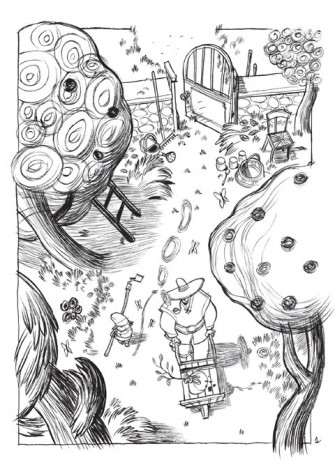 SPURGEON:
SPURGEON: Three Shadows
?
COLLINS: This was good pretty to look at, and unpredictable. I think that's an achievement for one of these "fairy tales for grown-ups" deals, which are often just dreadful.
SPURGEON:: Nail that down a bit more for me, if you would. What about it did you think was good beyond its visual appeal and narrative uncertainties?
COLLINS: Well, I think the visual appeal and narrative uncertainties
were what was good about it. I wouldn't wanna go beyond that! Like, take something like
Pan's Labyrinth, which was an egregiously overrated, pat depiction of the hackneyed concept of "lost innocence" and how cruel the world can be to children. I think
Three Shadows kept things strange and added stuff that was unnecessary for the purposes of getting across its central idea. Oddly, despite experiencing something similar in my real life, I didn't find I connected with that aspect of the book any way but intellectually -- it's the extraneous stuff that grabbed me. What did the bit with the giant or all that stuff with the witch doctor at the end have to do with the basic idea about the kid and death? Not a whole lot. But besides being interesting in and of themselves, I think they subtly conveyed the idea that life is going to twist and turn and move on around whatever tragedy it is you're facing. Those narrative filigrees and digressions were what made the book.
SPURGEON: Boy's Club
?
COLLINS: Goddammit, this comic book is
so funny. It's the only time I've ever wanted to do fan art for a comic, or do a
Cold Heat Special homage to it. I guess that's because it's not just hilarious, it also really nails these characters and that world of collegiate male sloth, gluttony, and stupidity. I am proud beyond measure to have two results on the first page of
"Boy's Club Matt Furie" google search results.
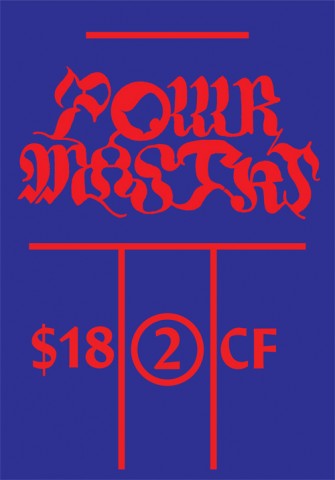 SPURGEON:
SPURGEON: Powr Mastrs
?
COLLINS: There's a degree to which I'm a little sore about
C.F. drawing a swastika in my Bowie sketchbook, and then later giggling about it when I gave the book to Lauren Weinstein to draw in. (I see you, C.F.!) But I think that tinge of unpleasantness really works for the material, which is what fantasy would be like if whimsy were replaced by seediness. It strikes me as angry and dangerous work. Doing a plot-based genre comic, however altcomix it may be, but pushing the violence and sex as far as he has?
I think he's doing something important and lasting -- I imagine the eventual collection will be a landmark. I'm consistently delighted by his imagery, too, from the costumes to the splash pages. That $18 price point per volume until then has got to be a deal breaker for a lot of people, though, no? I think PictureBox's dual role as comics publisher and art book publisher jiggers with the price points in ways I don't understand, to be fair.
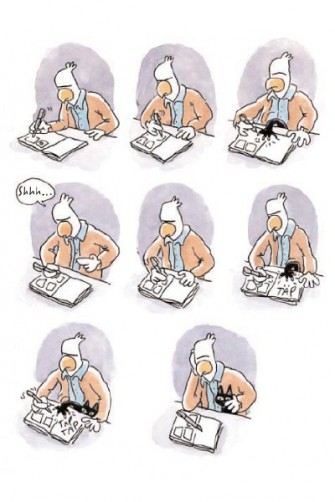 SPURGEON:
SPURGEON: Little Nothings
?
COLLINS: Like the Lynda Barry stuff, this will come across more negatively than I actually feel, but while I have nothing against him,
[Lewis] Trondheim doesn't do anything for me. A lot of these respectable French cartoonists don't rev my engine. I almost wonder if what I see in a lot of the big French literary comics guys is what people are worried about happening if the book publishers take over literary comics in this country -- a lot of polite comics about grown-ups.
SPURGEON:: That's an opinion I've come to understand is commonly leveled at many of the French-language books of that type, but do you make any distinction between books from earlier in the careers of an artist like Trondheim and the work he's doing now?
COLLINS: I've never been grabbed enough by Trondheim to make me want to follow his career to the point where I could draw those kinds of distinctions, so I can't really say. I guess I appreciate that these cats are so prolific and do all these different kinds of books -- children's adventures, revisionist fantasy, funny animals, autobio, etc. I just can't say that the art is enough to draw me in, and for the most part neither is the subject matter. I think that duck design is bland, and I wouldn't be all that interested in watching him storm Omaha Beach or have sex with the duck equivalent of a young Monica Vitti, let alone sit under a tree and think or talk to his cartoonist friends about their crises of confidence.
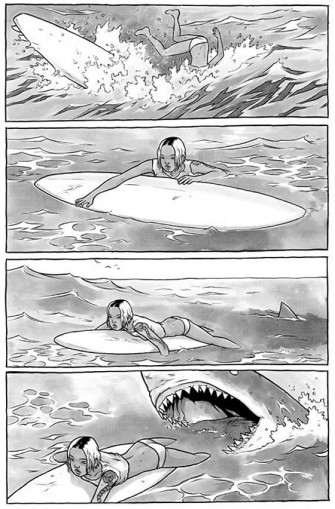 SPURGEON: Is there any book or short story that you feel was vastly misunderstood, or not even talked about to the extent it should have been? What about overpraised?
SPURGEON: Is there any book or short story that you feel was vastly misunderstood, or not even talked about to the extent it should have been? What about overpraised?
COLLINS: Ross Campbell, of
Water Baby and
Wet Moon, is a major talent doing bizarre and idiosyncratic work, but I'm not sure anyone outside goth circles gives him the time of day. His art style virtually guarantees that people who would get a lot out of both the laconic way he tells a story and the down-and-out characters he's chronicling aren't paying attention, but they really should.
There were
two new
books from Jason this year, and a new issue of
Tales Designed to Thrizzle from Michael Kupperman.
Look Out!! Monsters was a visually arresting and emotionally political comic that almost no one talked about.
Big Questions #11 was the best one yet. All of those books were slept on to one extent or the other, at least relative to how big a deal people
should have made out of them.
If I ruled the comics blogosphere I'd insist that people who know better spend less time kicking superhero books they know they're not gonna like in the teeth and more time writing reviews of books they and their readers will get something more out of than
schadenfreude.
Overrated? I don't think
Alan's War is best of the year material. It's a perfectly good book, but the art strikes me as stiff at times, like a particularly nuanced photoshop filter, and the aimlessness of the story doesn't quite get it over.
You know what, though? I think I got pretty lucky this year and mostly read stuff I ended up enjoying. There was the occasional let down, but one of the luxuries of writing this stuff for my personal blog is that I didn't have to read anything I didn't want to, so books I had a hunch I wasn't going to enjoy to begin with rarely if ever made the cut. Now that I mention it, that's an important thing to note: I'm primarily reviewing comics for my own enjoyment. That could be a flaw, depending on how you look at it.
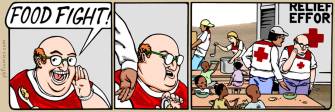 SPURGEON: Sean, how much work are you seeing on-line? What do you think of the books that Dark Horse has been releasing featuring popular on-line features? Are you still reading
SPURGEON: Sean, how much work are you seeing on-line? What do you think of the books that Dark Horse has been releasing featuring popular on-line features? Are you still reading Achewood
?
COLLINS: I don't read any comics online now that
The Perry Bible Fellowship is over. I'm not a big comic strip person I guess -- it's not like I read the funnies, either. I know that this makes me a bad person, and I accept that. For serious, I'm aware that I'm missing out on a metric ton of worthwhile comics, but sometimes you just max out on stuff you have the mental energy to pursue at a given time. It's sort of like how I don't play video games, not because I don't enjoy them or because I have some sort of philosophical problem with them, but just because I have enough hobbies right now.
I was an early
Achewood adopter from back when it was the toast of the
Comics Journal message board, and I'm proud to say I'm responsible for its first mention in a national print publication (the
Abercrombie & Fitch Quarterly, LOL), but I pooped out on it years ago. Before the advent of RSS, going to the site on a daily basis was just too much for me. I keep meaning to spend a while maybe reading a month's worth of strips every day until I'm caught up, because it's not like I ever didn't love it. Webcomics are just not a format I ever cottoned to, is all.
I have the
PBF book and
the Achewood book that
Dark Horse put out and they're both lovely objects. I'm irritated that the
PBF material is going to be re-collected in
a more complete volume soon, though. And they should have started collecting
Achewood from the beginning for pete's sake. A crazy person like me is never just going to jump in and read a storyline from the middle of the strip.
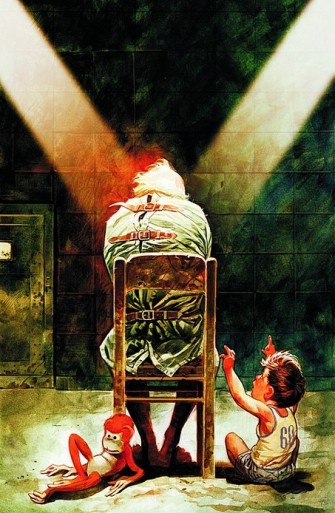 SPURGEON: One of the more interesting publishing news stories was the conclusion of
SPURGEON: One of the more interesting publishing news stories was the conclusion of Y the Last Man
, a period of appreciation and demand which we may see replicated in the soon-to-finish 100 Bullets
. Most retailers to whom I've spoken tell me that Fables
is the easiest Vertigo book to sell, and all I can think is that's the only comic they do that really seems to me like a Vertigo series. Are we seeing the last Sandman
-model high concept series? Are Northlanders
and Scalped
different kinds of books, or just different books?
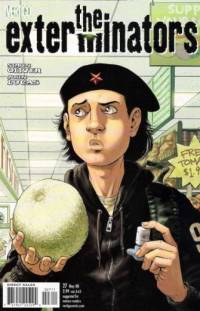 COLLINS:
COLLINS: What's the high concept of
Sandman?* I never looked at that book that way, but I'm probably missing something. It doesn't seem like one of those other one-sentence wonders you mentioned. Anyway,
Bill Willingham and
Matthew Sturges's series aside, the basic Vertigo template is much less "grown-up fantasy/fairy-tale" than it used to be -- now it's series with cursing and titties and murder and the color brown, some set in a stylish milieu, some set in a squalid milieu, and some set in a combination of the two. In that sense, I'd say
Preacher and to a certain extent
100 Bullets are the most influential series at the imprint -- more of the current Vertigo line owes itself to them than to
Sandman. Personally I thought the best of this sort of series was
The Exterminators.
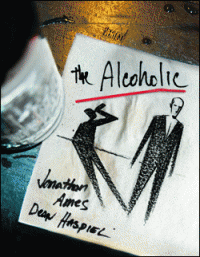
Sometimes I wish they'd stop going for that R-rating, HBO Original Series vibe, because when you look at their successful flagship titles over the years, yeah they've always been a mature-readers, but there's usually more to it than that.
100 Bullets has that beautiful art,
Y was downright sweet a lot of the time, and
Sandman even did whimsy, all of which are about as far away from
Scalped as you can get. It's tough to imagine a character
shaped by the persona of Tori Amos in a Vertigo book today, you know? I've read some entertaining
Hellblazer comics lately, though. I guess mostly I'm curious to see where their OGN line goes.
Pride of Baghdad,
Incongnegro,
The Quitter,
The Alcoholic -- these are all pretty far away from both the
Sandman and
Preacher Vertigo strains. I wonder if they'll give ongoing series in that kind of vein a try, or perhaps if some of the Minx titles that didn't make it out will migrate over here.
SPURGEON: Why do you think so relatively few people paid attention to Chris Ware over the last few years?
COLLINS: He's been at an intimidating level of quality for a decade, his comics come out late in the year when people are in the throes of listmaking or afterwards when it's too late to get traction, there's inevitably some "emperor has no clothes" backlash about him that reduces the pool of people willing to give his new stuff a review, and this is just my experience talking but I think review copies might be hard to come by. Finally, this isn't a problem for me, but his comics really are about how life can defeat you, and that's not always a theme that people feel up to engaging.
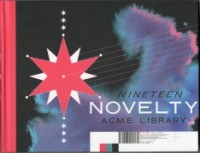
As soon as I get my hands on the new
Acme you can bet I'll pay him some attention, though! God, Chris Ware. This guy did the Quimby stuff for his school paper. Doesn't that make you want to kill yourself?
SPURGEON: Everything makes me want to kill myself. Speaking of which, how scared do you think arts and alternatives comics makers should be about the shape of the economy? You're demographically desirable: a young married, educated, willing to spend part of your budget on comics. Do you hear anything from anyone that suggests specific weaknesses with how companies making art or alternative comics reach customers like you?
COLLINS: I think everyone should be terrified. I mean, the next time me or my friends have to look for a job in entertainment journalism and publishing in New York, we'll be up against people with
Entertainment Weekly and
Time on their resumes. It's awesome that with the exception of a few companies with their own unique problems, comics have thus far dodged the purges that have plagued the newspaper, magazine, and book publishing industries, but surely that can't last forever, and eventually someone with a metal hockey mask and a loincloth will encircle the
Librairie Drawn & Quarterly with his minions and tell Chris Oliveros that he will be given safe passage in the Wasteland if he just walks away.
That said, if they keep publishing good comics, I'll keep getting them. I don't know what else to say beyond that. From my outsider, layman, economically ignorant vantage point, the important artcomics publishers all seem to be on pretty stable ground in terms of how they work with the bookstore market, their relationships with their communities both in the real world and online, the type of work they're interested in publishing and their ability to do so, and so forth. While we're on the subject, I'd imagine
Top Shelf, who I might otherwise be more concerned about just because you don't see them in the position to purchase and open retail locations like D&Q and Fanta and PictureBox have recently, is in store for a monster sales year courtesy of their Alan "
Watchmen" Moore catalog, which will soon be larger thanks to the next
League of Extraordinary Gentlemen book.
A while back, James Murphy from LCD Soundsystem described Nine Inch Nails as
"lifeline music." One of the benefits of being an industry for dedicated enthusiasts is that comics is virtually a lifeline medium. Perhaps nowhere is this more true than with alternative comics. I think that will help us weather the storm if nothing else does.
*****
* that's the cover to
Boys Club #2 altered so that Matt Furie's characters are watching Sean T. Collins on TV. Hey, it gets boring late at night.
* cover to
KE7
* cover to
Black Hole
* interior art from David Heatley "Overpeck" serial
* cover to
Notes For A War Story
* cover to
Bottomless Belly Button
* cover to
Burma Chronicles
* page from
What It Is
* cover to
Travel
* interior page from
Three Shadows
* cover to
Powr Mastrs Vol. 2
* interior page from
Little Nothings
* interior page from
Waterbaby
* a
PBF, randomly selected
* cover art to last
Y The Last Man comic book
* cover to 2008 issue of
The Exterminators
* cover to
The Alcoholic
* cover to
ACME Novelty Library #19
* art by Matt Wiegle from one of Sean T. Collins' fine short stories in comics form
*****
*
Editor's Note: In case anyone wondered, I always figured that the high concept of Sandman was one of the oldest ones, that we were basically getting Gaiman's first crack at "The Gods Walk Amongst Us."
*****
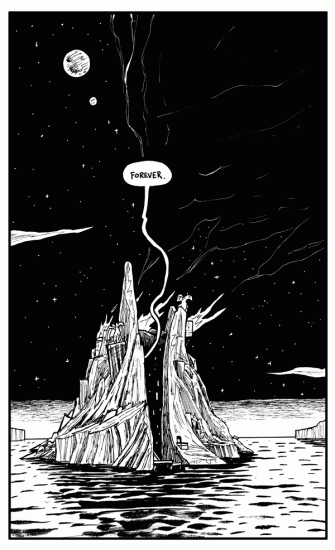
*****
*****
posted 12:00 am PST |
Permalink
Daily Blog Archives
November 2019
October 2019
September 2019
August 2019
July 2019
Full Archives


